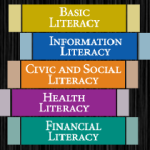by Ashley Flynn
The evolving technology landscape makes for a very exciting – and challenging – aspect of library service. For librarians, staying up to date with the numerous devices on the market is daunting. However, the public desperately needs exactly this type of help to develop their information literacy. Cambria County Library, located in the heart of downtown Johnstown, has formed a promising new partnership to provide device-specific assistance to their community.
The service works very simply, according to Mary Lou Repsher, District Consultant. IT specialists from Pitt Bull Technologies set up shop in the library two days per week. “The techie is prominently seated at a table near the circulation desk and he has access to our internal wifi where he can use his resources and ours,” Repsher explained. “Patrons seat themselves and ask questions!”
The partnership formed when Repsher sought Pitt Bull’s help for a staff development day. The local company, which provides technology support and education to schools and individuals, provided training on ebooks and devices to library staff. After their involvement in that training, the folks at Pitt Bull “saw an opportunity to provide a new service to our patrons while possibly creating new business for themselves,” Repsher noted. They offered to provide two days of free service a week on any device in the library. If a patron needs more help than Pitt Bull can give in a short interview, they are able to set up a pay-appointment outside of the library. In this way, a mutually beneficial relationship developed.
Our staff tries hard to give as much help as their expertise allows but they cannot possibly be familiar with the endless variety of devices,” Repsher said. “Pitt Bull techies can give personal attention for just the device in front of them and they aren’t distracted by trying to provide other library services at the same time.”
The staff also appreciates having a designated technology expert on hand. “Our resident librarian who is the ‘go-to-for-device help’ person said she has absolutely had less people asking for in-person device help,” added Lyn Meek, Director of Cambria County Library. “She still gets requests for help over the phone but feels the word is out!”
Only a small amount of marketing was required to connect the public with this new service. The local newspaper ran an introductory article on the new program and even awarded a laurel to the library for offering such a valuable service. In addition, “we have a sandwich board on the sidewalk in front of our building practically shouting to everyone on Main Street that the techie is here!” Repsher said.
Challenges have been limited, and consist primarily of patrons who monopolize the techie. Addressing this problem can be as simple as enforcing time limits on sessions when necessary.
There has been some talk of expanding the program throughout the district, depending on its continued success. Building a similar program could be achieved in many other libraries by reaching out to the right company. “We were extremely fortunate that Pitt Bull suggested the service to us themselves,” Repsher stated. “If we are successful, a library might approach an IT business and point out the success of the program here at Cambria County Library. Try to get a relationship going,” she recommended.
“There is a crying need in our community for help with information literacy,” Repsher said. Librarians can help meet that need without overextending their own resources by following the fine example set at Cambria County Library.

